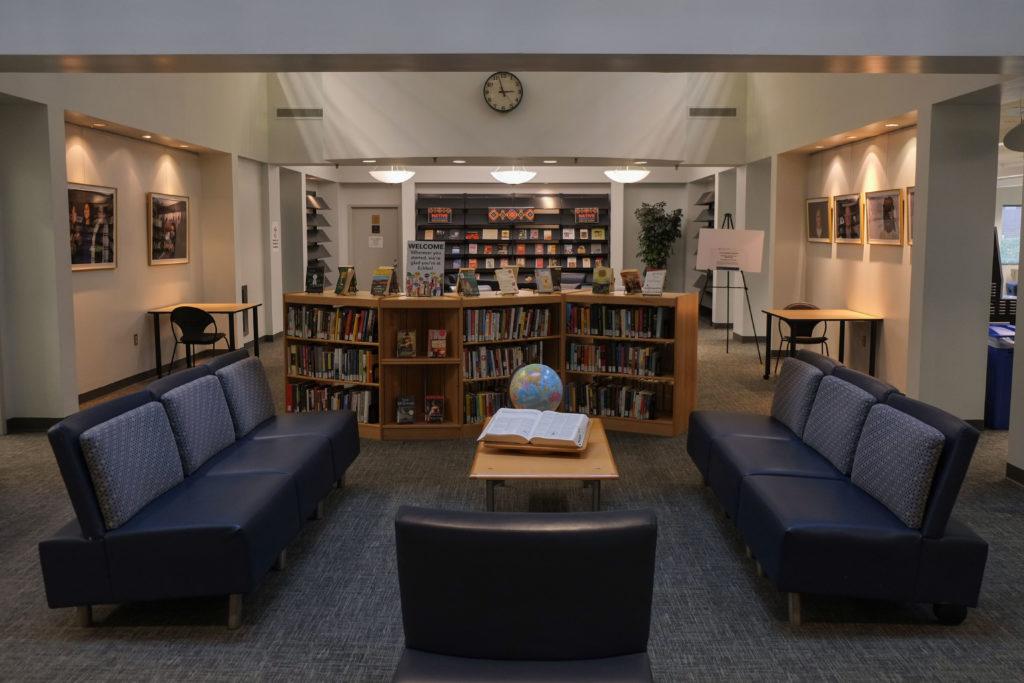Officials said they reduced the hours of Eckles Library last fall after closing the library due to the COVID-19 pandemic, but freshmen living on the Mount Vernon Campus said the reduced hours are an “inconvenience” that limits their studying opportunities.
Geneva Henry, the dean of libraries and academic innovation, said officials decided to reduce Eckles’ hours when the library reopened last fall after finding that, on average, few students used the library in the mornings and after midnight. Freshmen living on the Vern said Eckles’ operating hours – noon to midnight Sunday through Thursday and noon to 6 p.m. Friday and Saturday – inhibit their productivity because the times they can study in the library while on the Vern are limited, unlike Gelman Library which is open 24 hours a day.
The current operating hours of Eckles are 37 percent less than the available hours in fall 2019, which were open from 8:00 a.m. to 3:00 a.m. Monday through Thursday, according to an earlier version of the GW Libraries website.
“To best use our limited staffing budget, hours at Eckles were reduced to ensure the continuation of 24-hour service at Gelman,” Henry said in an email. “This realignment of Eckles’ hours with study usage also allows us to provide a regular schedule of evening research consultations at Eckles.”
Henry said while there is one librarian permanently stationed at Eckles, many librarians stationed at Gelman travel between the campuses. She said the resources officials allocate to Eckles, like books and furniture, come from a centralized budget for all three of the University’s libraries – Eckles, Gelman and the Virginia Science and Technology Campus Library.
Faculty said budget cuts implemented in 2020 to combat the financial impact of the COVID-19 pandemic limited funding for GW Libraries and increased burnout among library staff members as they picked up additional responsibilities, like managing book deliveries to Gelman.
“Staff, books, library resources and furniture all come from a central budget and aren’t allocated specifically to Eckles from year to year,” Henry said. “Instead, we look at the libraries as a whole and prioritize spending where it is most needed.”
Gordon Mantler, an associate professor of history whose office is located in Ames Hall on the Vern, said Eckles was open in the mornings before the onset of the COVID-19 pandemic and served as a place for students to hang out on the campus.
Mantler, who also serves as the executive director of the University Writing Program, said faculty who oversee the Writing Center – which is housed under the University Writing Program – also paused services at their satellite center in Eckles after Columbian College of Arts and Sciences officials instructed them to decrease their operating expenses for the academic year.
“A lot of this has to do with just recovering from the pandemic in terms of resources,” he said. “We might think things are normal, but they’re not, and so the University is taking longer to be able to get back to where it was at another era.”
Ten freshmen who live on the Vern said Eckles’ reduced hours limit the opportunities they have to study while on the Vern and drive them to find alternative locations to study.
Carola Petrucci, a freshman double majoring in human services and social justice and journalism and mass communication, said the library’s operating hours are “annoying” because she is not able to study there before noon every day. Petrucci said she often studies inside the 24-hour computer lab located at the entrance of Eckles instead.
“The computer lab is open 24 hours a day, so I’ve literally just been sitting in the computer lab with the old computers,” Petrucci said. “It’s not super helpful.”
Pravina Khadka, a freshman majoring in journalism and mass communication, said she studied at Eckles frequently during the beginning of the fall semester but rarely does now because she finds the hours to be an “inconvenience.” She said extending Eckles’ hours would give students on the Vern more flexibility to plan their studying times.
“Something like opening up early and closing a little late, it doesn’t even have to be 24 hours, would be extremely convenient,” she said. “Because I do like Eckles, it’s mainly the timing thing.”
Isabelle Steinbrunn, a freshman majoring in art history and history, said Eckles’ Saturday hours are particularly inconvenient because the library is only open until 6:00 p.m., unlike Sunday through Thursday when the library is open until midnight. She said she has often had to leave Eckles earlier than she originally planned.
“It’s actually horrible,” Steinbrunn said. “There’s been several times where we’ve gone at 5:30 p.m. on a Saturday and they close at 6, and it just is super inconvenient. Even when you’re there just at 10, having to leave at 12 is inconvenient, compared to Gelman where you can stay 24 hours.”
Four freshmen living on the Vern said they have noticed Eckles’ limited hours but do not find them a major inconvenience.
Matthew Lopez-Duke, a freshman majoring in biology, said he thinks the current schedule of Eckles’ operating hours is “fine” because he finishes most of his schoolwork during the day and does not need to use the library late at night.
“I’m not one to stay up really late to do homework,” he said. “I try and do as much as possible in the day, so I don’t mind when they kick us all out at midnight.”
Julia Stone, a freshman majoring in neuroscience, said she has also had experiences where she is in Eckles when it closes at midnight and is asked to leave but does not consider it an inconvenience.
“They close at midnight, which, like, occasionally I’ll be there at midnight and have to go, but I haven’t had too much of a problem with that,” she said.
Caitlin Kitson contributed reporting.








